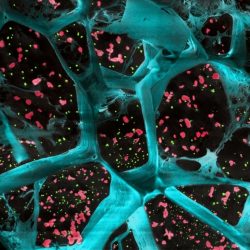Cancer immunotherapies can sometimes target normal cells in addition to tumors. Quanyin Hu, a professor in the UW–Madison School of Pharmacy, and his team have developed a method to get around this problem.
They engineered a protein to target blood cells in tumors and direct them to clot. Once clotting begins, the researchers inject drones in the form of blood platelets engineered with immunotherapeutics on their surfaces. This allows for efficient, targeted drug delivery to the clot-filled tumor.
“Once we have this clot formation at the tumor site, we have this so-called cellular hive that can attract these therapeutic drones,” Hu says.
In mice studies, Hu and his colleagues found that the engineered platelets efficiently delivered a common immunotherapy drug known as an immune checkpoint inhibitor to the tumor sites. The checkpoint inhibitors encourage immune cells known as T cells to eradicate cancer cells.
Mice that received the treatment saw their tumors shrink and lived longer than mice that received a traditional immunotherapy treatment. Notably, one-third of the mice that received the treatment became completely tumor free.
A more comprehensive safety evaluation is the next step — in particular, to make sure that the therapy doesn’t cause clots in unintended locations.
But the findings open the possibility to more effective and versatile cancer treatments with multiple types of drugs and fewer side effects.
Published in the Fall 2023 issue




Comments
No comments posted yet.